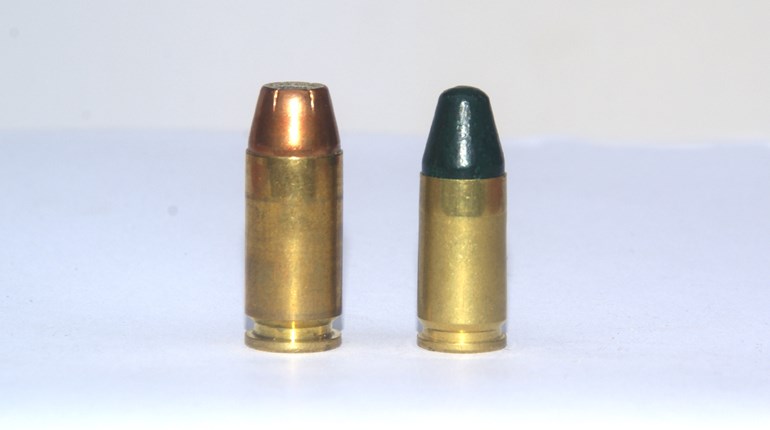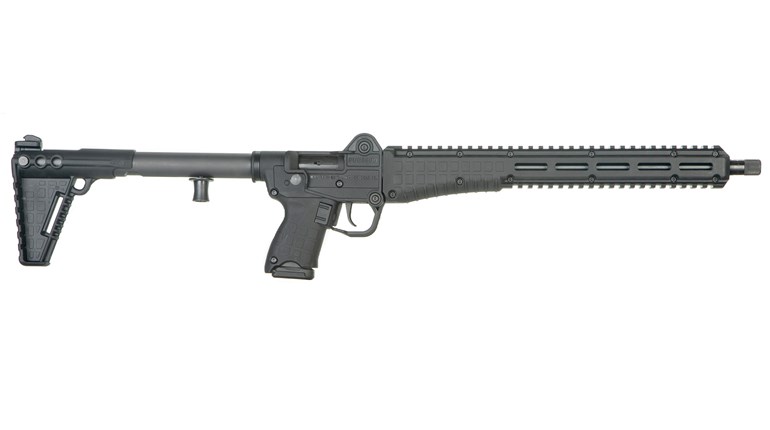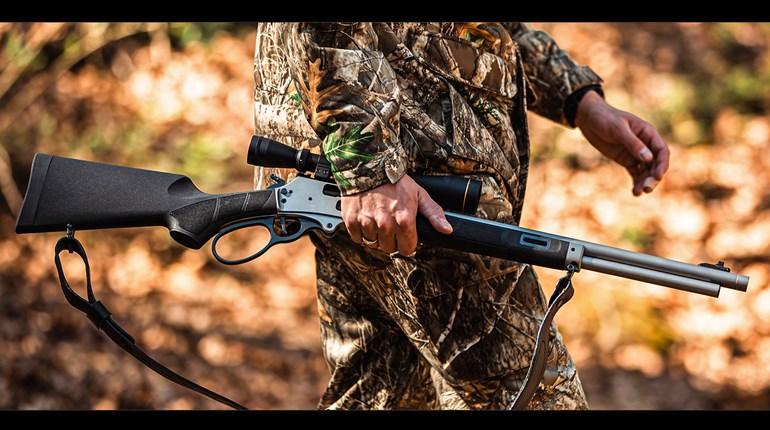
Genuine Heckler & Koch roller-delayed blowback arms such as the HK 91, 93, and 94 have always been popular with American shooters and collectors, but, aside from the HK SP5K imported in 2017, these legacy arms have been unavailable since the early 1990s. The reasons for the drought are trifold: a ban on imported “non-sporting assault weapons” dating to the first Bush administration, a reluctance of the company’s owners to sell them to civilians, and German export regulations.

This situation undoubtedly frustrated HK USA as it saw millions of dollars in U.S. commercial sales lost to imported clones made by former HK licensees in Turkey and Pakistan while having to explain why they couldn’t sell an authentic HK to American buyers who clamored for the real German made product.
Fortunately, this changed and in a year that held few positives for American gun owners, HK USA is now importing two pistols, the SP5 and SP5K-PDW that are patterned on the MP5 and MP5K submachine guns, respectively. This article will address the SP5K-PDW which is the shorter model designated by the letter “K” that stands for “kurz”, which means short in German. PDW stands for Personal Defense Weapon.
Though the SP5K-PDW is a new HK release, it’s actually the third pistol configured evolution of the MP5K. The first model was the SP89 that was made from 1989-1994 before the Clinton "Assault Weapons Ban" banned its importation by name.
Over two decades later in 2017, HK released a modernized version of the SP89, the SP5K, but that model did not sell as well as expected because it lacked certain features that the clones and more importantly, the MP5K had, namely, a tri-lug adapter, threaded barrel, and paddle-style magazine release. Those shortcomings are not a factor in the new SP5K-PDW, making it appealing to collectors and shooters alike who won’t settle for substitutes even with lower price tags.
Gun Details
The SP5K-PDW cycles using the roller-delayed blowback operating system. This system delays the opening of the breech until gas pressure in the chamber has subsided to a level where a ruptured case or significant gas blowback towards the shooter is not a risk. It does this by delaying the opening of the breech using mechanical delays instead of relying on spring tension and a heavy bolt as with simple blowback systems. Roller-delayed blowback systems are lighter, generate less perceived recoil and allow for more accurate firearms than simple blowback, but require more manufacturing precision and are costlier as a consequence.

The SP5K-PDW comes in a custom fitted high quality Boyt H series hard plastic case with two, 30-round magazines, a sight adjustment tool and a neck sling. Dimensionally, this pistol is 13.8 inches long, 2.8 inches wide and weighs 4.2 pounds. Compared to the SP5, the SP5K uses a shorter 5.83-inch barrel and a shorter receiver and bolt carrier group.
The SP5K-PDW retains the operational features of HK’s legacy arms the most salient of which are a left side non-reciprocating charging handle and a bolt that does not hold rearward after the last round in the magazine is fired. The trigger pack, however, is HK’s current design which uses a roller trigger sear which makes the trigger stroke smoother and ambidextrous safety levers that are better shaped and far more ergonomic than earlier iterations that are still used on the imported clones.
The stamped steel receiver is made using the same materials and finish as the martial version of this firearm with a parkerized base finish followed by electrostatically applied satin black paint on the outside.
The SP5K-PDW uses the trademark iron sights of HK legacy weapons which consist of a fully protected front post and an adjustable rear drum style sight. Because the SP5-PDW is a pistol with much longer eye relief from the rear sight than the shoulder stocked MP5 submachine gun, HK equipped it with the same sights as the MP5K. Thus, the rear sight offers four different width square notches arrayed on the edges of a rotating drum instead of four different sized apertures used on the MP5. The operator can rotate the drum to select small notches when finer sight alignment is needed, or wider notches for low light and rapid front sight acquisition. Windage and elevation adjustments to the rear sight are made using the supplied tool.

For mounting an optical sight on the PDW, there aren’t any solutions other than using clamp-on style rails which engage four small tabs on the receiver. I’ve used the aluminum HK and MFI rails both of which attach securely, allow you to use the iron sights when the rail is mounted, and do not interfere with the charging handle.
Live Fire
I tested the SP5-PDW for accuracy and ammo preference using its native sights and shooting from a Caldwell Precision Turret rest at 25 yards followed by several sessions using the supplied neck sling and an arm brace from Gearheadworks to gauge its practical handling.
Firing from the rest, this pistol proved accurate to shoot thanks in part to its fixed barrel and good sights with a 10.2-inch radius. The best/average five-shot groups shot from the rest were SIG Sauer .90/1.22 inches, Black Hills .93/1.20 inches,and Winchester USA loads 1.30/1.89 inches.
The PDW functioned flawlessly, but like the SP5, requires you to download the 30-round magazine by one cartridge if you intend to load the pistol with the action closed. The magazines are made from steel and drop free. They have unmarked witness holes at the rear that indicate 10, 20 and 30 rounds with the 20- and 30-round holes visible to the operator when the mag is inserted into the pistol.
The trigger has a specified weight of pull of 6.7-10.1 pounds and my sample measured 7.5 pounds using a Lyman electronic scale. That’s a relatively heavy pull, but the trigger’s generous width reduces the perceived weight. The trigger’s 3/8 inches of take-up encourages you to stage it, then push it over the break when your sight picture is ideal and not having any over travel after the break is helpful to your follow through.
Marksmanship with large format pistols like the SP5-PDW requires adopting new techniques and in some instances adding accessorial equipment. For example, firing the PDW with a conventional hold with both hands grasping the grip is easy to assume and aim, but results in considerable muzzle rise caused by the bore axis being far higher than the grip.
The better, albeit less comfortable, technique to control muzzle rise is to grasp the top of the magazine well and forend with the support hand. (This isn’t the method shown in the HK manual with the support hand grasping the forend alone because that technique strains your wrist by positioning your hand unnaturally.) The bungee cord neck sling included with the PDW can also help. Attach it to the receiver end cap, then wrap it around the neck and under the shoulder of the firing arm and make it tight when you extend the pistol outward using the “magwell grab” technique.
The best way I found to shoot this pistol accurately, however, is to add an arm brace that mitigates muzzle rise and reduces your wobble zone considerably. I tested the Tailhook brace made by Gearheadworks which uses its Tailhook device attached to a side folding arm made by Choate Machine and Tool. (Gearheadworks also makes a longer brace for the SP5 and other pistols while Choate makes several folding stocks if you wish to convert your HK into a Short Barrel Rifle after receiving ATF approval.)

Though there aren’t many arm braces available in the market, the Tailhook works much better than any other I have tested. Used as intended, it takes the pistol’s muzzle heavy weight off the firing wrist without needing to adjust the annoyingly awkward and time consuming straps that are used on some other braces. The Tailhook is also reversible for left-handed shooters, deploys quickly, and perhaps most significantly, allows you to use the PDW’s iron sights to aim without having to cant the weapon or install high mount optical sights.
Summation
Like many other new HK products, the SP5K-PDW took a long time to come to market, but the company got it right with a design that incorporates authentic MP5K features into a very accurate, reliable, and well-made handgun. And for those who want even more, this pistol accepts aftermarket enhancements from Magpul, Midwest Industries and others.
ACCURACY DATA
Group Sizes (Inches)
- Black Hills 124-grain JHP +P: Smallest (.93); Largest (1.50); Average (1.20)
- SIG Sauer 115-grain FMJ: Smallest (.90); Largest (1.65); Average (1.22)
- Winchester 115-grain FMJ: Smallest (1.30); Largest (2.35); Average (1.89)
Velocity (FPS)
- Black Hills 124-grain JHP +P: Average (1,350)
- SIG Sauer 115-grain FMJ: Average (1,285)
- Winchester 115-grain FMJ: Average (1,226)
Heckler & Koch SP5K-PDW
- Caliber: 9x19 mm
- Barrel: 5.83 inches, 6 groove, RH Twist
- Overall Length: 13.8 inches
- Width: 2.8 inches
- Height: 8.66 inches
- Weight: 4.2 pounds (without magazine)
- Sights: Fully adjustable, drum-type rear, protected post front
- Stock: Polymer
- Action: Semi-auto, roller-delayed blowback
- Finish: Black paint
- Capacity: 30+1
- Warranty: Lifetime of original buyer
- Price: $2,799
- Heckler & Koch, 5675 Transport Blvd, Suite #200, Columbus, GA 31907 USA (706) 568-1906 www.hk-usa.com



































